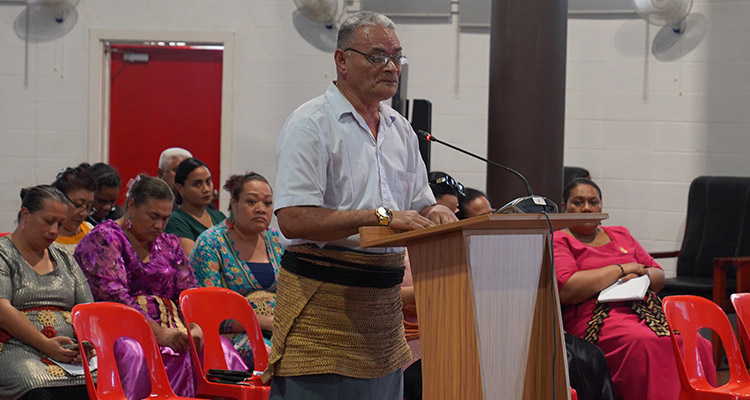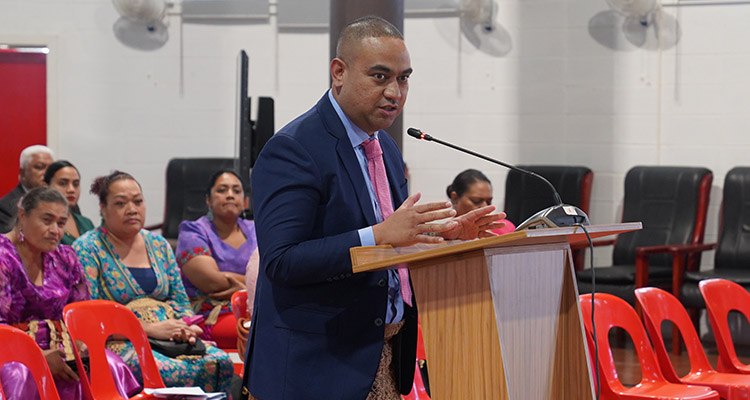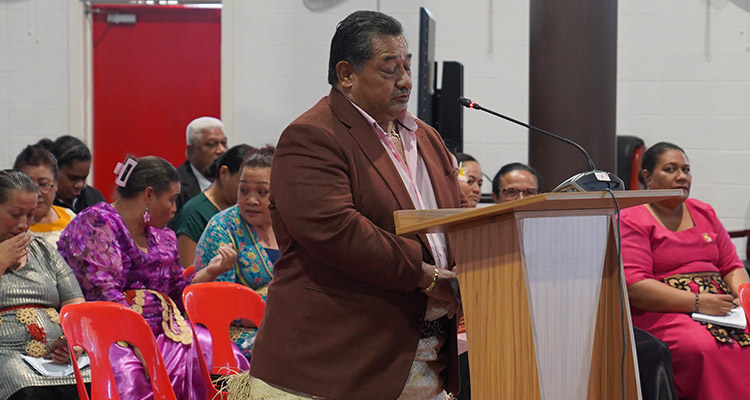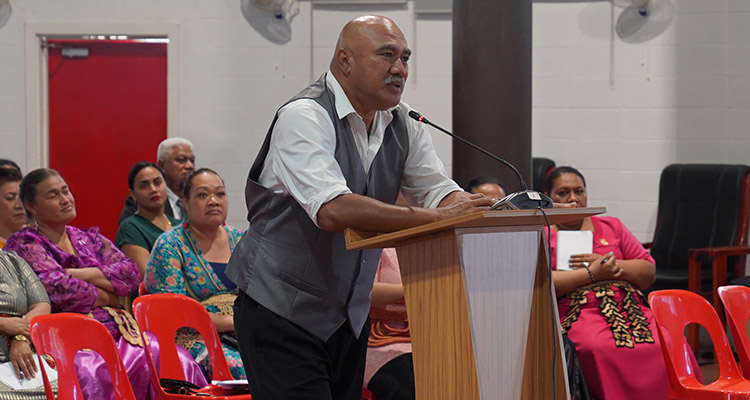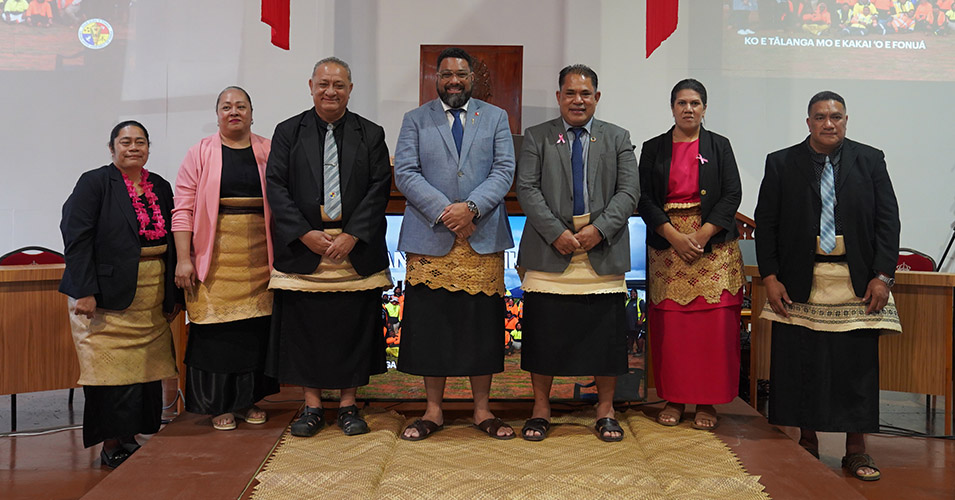
By Katalina Siasau
The benefits and challenges of the temporary labour mobility programs to Australia and New Zealand was the topic of the Speaker’s second public debate held at Parliament House in Nuku’alofa on Friday, 4 October. While Tonga welcomes the income and social benefits brought by having over 5,000 workers overseas sending money home, the exodus of its prime workforce has led to a critical shortage of labour on farms, in businesses and in government in Tonga, while at home family breakups have increased.
Two Members of Parliament representing the supporting and opposing sides of the debate, were the People’s Representative of Tongatapu 1, Hon. Tevita Fatafehi Puloka, and Minister for Labour and Trade, Hon Dr. Viliami Uasike Latu.
A panel of speakers on the topic included Lesila Lokotui from Women and Children Crisis Center (WCCC), an Australian approved employer Mr. Siale Finau from Owen Pacific Workforce, PHD student Telusa Tu’i’onetoa, and ‘Akosita Polota the Deputy CEO of the Overseas Employment Division of the Ministry of Internal Affairs.
The debate ended with a 17- 17 tie vote from debate watchers, who were equally split on whether the benefits of labour mobiity outweigh the challenges for Tongans.
Thousands of young workers leaving
Deputy CEO of the Overseas Employment division of the Ministry of Internal Affairs, 'Akosita Polota, there were 5,152 people leaving Tonga this year from January to June, going on Australia and New Zealand's mobility schemes.
There were 2,800 Tongans on Australia’s short term PALM scheme (7-9 months), 1,365 on the long term PALM scheme (1-4 years), and 987 on New Zealand’s RSE.
Within that number, 56% are between the age 18 - 30 years.
Polota said most Tongans in these mobility schemes are medium skilled, and unskilled workers.
Job opportunities
Hon. Dr. Viliami Latu spoke about the benefits of the mobility schemes for Tonga, which provide job opportunities for the unemployed and those who cannot find permanent jobs in the Government and the public sector.
He referred to a Tonga Statistics Population and Housing Census report that stated 25% of households’ main income are from the mobility schemes.
“It is a blessing for our country,” he said.
Dr. Latu emphasised the social benefits people get from these schemes, like paying for school fees, paying off loans, building small businesses in Tonga, developing skills that can help people acquire permanent jobs when they return.
“We’ve seen those who have bought vehicles and have built houses, which developed the quality of life and improved their state of living.
“New Zealand and Australia open up doors of opportunities to these benefits," he said.
Moreover, he said the mobility schemes can help people to apply for citizenships in overseas countries because, “Tonga does not have enough land.”
Lastly, he said this program helps build stronger diplomatic ties and peaceful cooperation between the two countries, New Zealand and Australia, and Tonga.
Australian approved employer, Mr. Siale Finau from Owen Pacific Workforce, said, since 2012, they have sent over 5,300 Tongans to Australia.
Likewise, he supported the mobility schemes, stating some Tongans in the program have reached the position of manager, and some have established small businesses here in Tonga.
Workforce shortages
However, Hon. Tevita Puloka raised deep concerns with these labour mobility schemes that “needs to be stopped.”
He noted the shortage of local farmers due to people leaving on the mobility schemes, resulted in the significant increase in farm products prices, because farm owners are paying more to farmers to keep them.
Puloka pointed out that Government projects are being delayed due to local labourers traveling overseas to participate in seasonal work programs.
Labour drain impacts local business
Business woman Elizabeth Cowley stressed the impact of labour drain in Tongatapu.
"We’re losing the best of the best. Not only in the business sector, but also in government and other sectors as well."
"We need to find a solution of how we can get our people and bring them back home to work."
Peseti Ma'afu a small business owner appealed to the Government and the Minsitry of Internal Affairs to assist with the issues small business owners are facing difficulty in finding workers to replace those who have left overseas on the program.
He said as a result of the exodus of workers, it takes longer than six months to find a replacement staff.
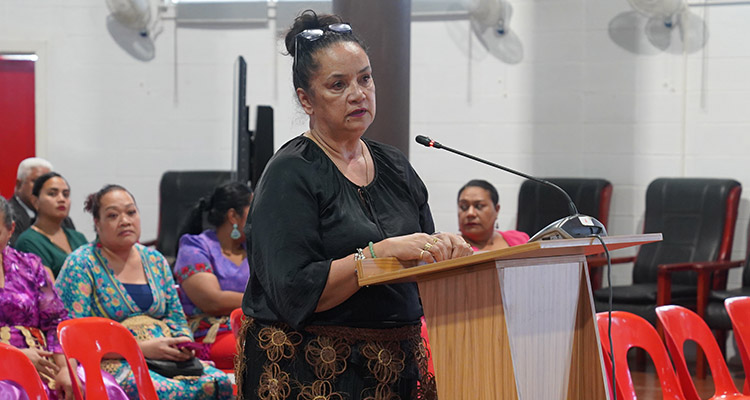
Broken families
Lesila Lokotui from the Women and Children Crisis Center (WCCC) said they saw 57 new cases in 2023, with family issues in relation to the labour schemes. This year from January to June, they had 48 new cases.
She said in the last 18 months, WCCC saw 105 cases, with 68 in Tongatapu, 11 in Vava’u, 10 in Ha’apai, and 9 in ‘Eua.
Lesila said one of the main cause of family issues family separation, as majority of Tongans in this program are the head of the family.
She noted that these absences has lead to affairs and divorce.
In some of their cases, mothers also leave on the program in order to help raise the children and provide for the family. Therefore, the children are being left on the care of family members and friends.
"This has caused children to feel neglected."
She said children are being left in unsafe environments that expose them to abuse, and violence.
Lesila added this has lead to other issues like teen pregnancies, school dropouts, and other cases that WCCC have seen, from lack of care to children.
Public opinion
The Legislative Assembly Office hoped the outcome of this debate would play a crucial role in shaping public opinion and informing policymaking regarding labour mobility.
The discussion was inspired by the King's message during the opening of Parliament's 2024/2025 session, when King Tupou VI emphasized the need to enhance the labour mobility supply management strategy.
